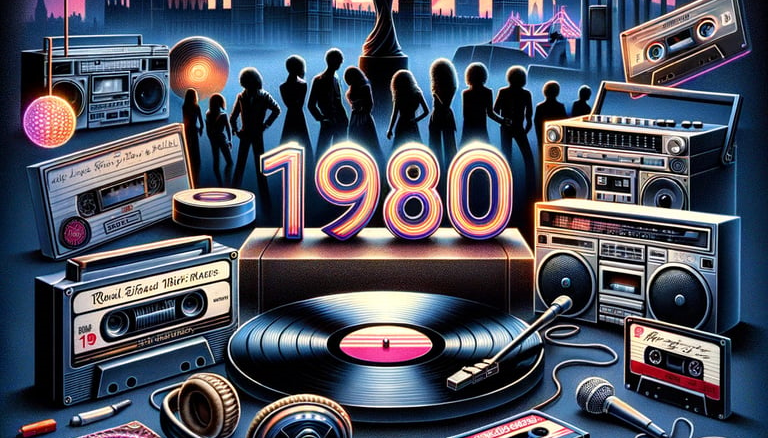
Let’s go back a few years to perhaps the most colourful era of British pop music. What a scene it was: punk had mellowed, new wave had surged, and from this vibrant soundscape, there was an outpouring of rock and pop music to savour. This is the story of 1980 Music Hits From The UK Charts.
As we exited the 1970s and embarked upon our new decade, little did we know what musical delights awaited us. 1980 was a solid start. As a ten-year-old, I had little access to ready cash so I couldn’t buy any 7-inch singles as I would be able to later in the decade.
However, I was keenly aware of the sounds in the charts. At least one of my schoolmates had older siblings and that way, a little of their tastes rubbed off on me. The four records from 1980 that found their way into my record collection reflect this.
Before I describe those singles and others from the UK charts, just a quick one about the vibe offered by music on vinyl. The distinctive hiss and crackle before a favourite song began is something that digital streaming can’t replicate. It gives a warmth and a sense of place too.
Unlike today when it could be argued that music has been reduced to data – easily accessible, yet physically remote, these black vinyl discs symbolised almost a direct link between us and the artists.
As I take you through some singles that I bought in 1980, I’m going to evoke a little of the time and why they’ve remained on my playlist after all these years.
Turning Japanese by The Vapors
Turning Japanese by The Vapors (note, no ‘u’) was quite the cultural phenomenon. The song mythically alludes to the idea of becoming so obsessed with something that you lose yourself. Alternatively, you may get a vibe about some sort of self-relief.
But that’s as an adult listening, for us kids it was a great sound pure and simple. It started with that guitar solo imitating a traditional Japanese lute-type instrument and went on from there.
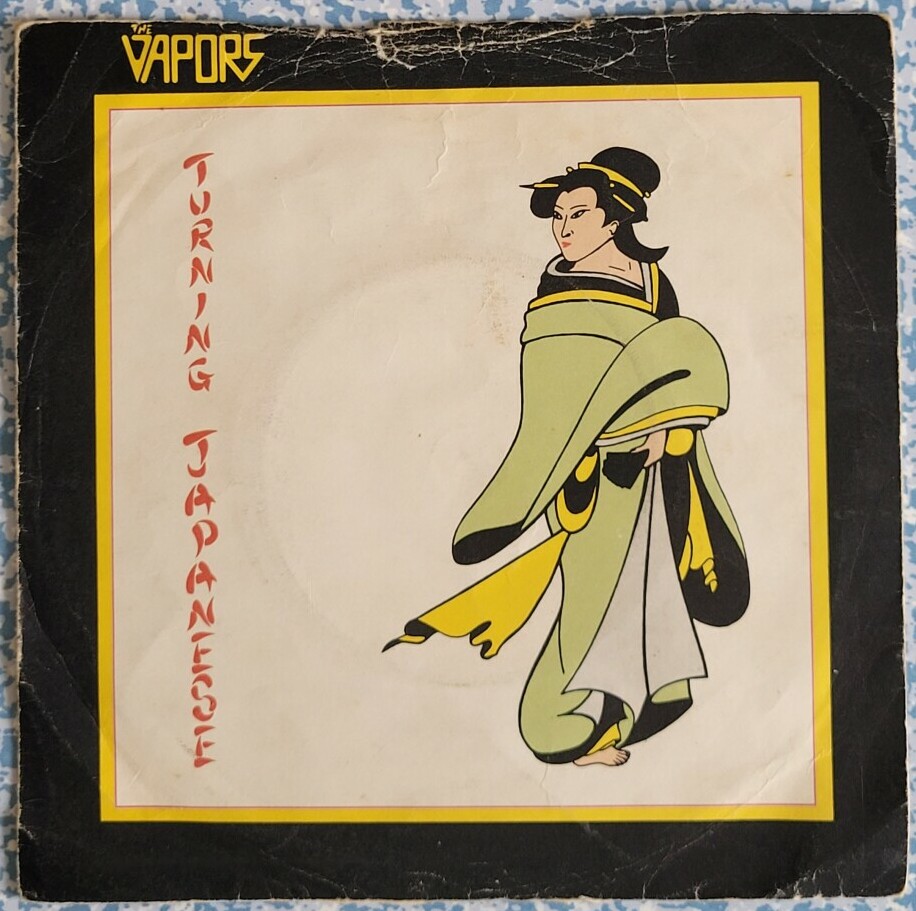
Anyway, you know the saying, ‘If I do nothing else in my life, I’ll be happy’? A sentiment that could almost have been coined for this song and the members of the group*. They were the next big thing. For a short moment, they were about to go global then, pfft! They fizzled out, like a dying balloon.
I think that my brother and I must have pestered Mum to buy this for us over the Easter Holiday, judging by the date of 16 April that I noted on the sleeve. First charting in February, it took about a month to make it to the top ten, where it spent 5 weeks, with its highest placing at number 3.
It then drifted away into the Guinness Book of British Hit Singles and the band pretty much did too – two subsequent singles, News at Ten and Jimmie Jones both stalled at number 44.
*Ed Bazalgette, lead guitarist with The Vapors, is a great-great-grandson of Sir Joseph Bazalgette, the engineer for central London’s original sewerage system. He has gone on to a career as a television director.
1980’s Chart-Toppers: A Walkthrough of the Year’s Best-Selling Singles
Out of the multitude of singles released, my four hardly scratch the surface. So, let’s have a deeper look at what was on offer. Even this won’t make much of a dent if we’re being totally honest. I’m offering you a look at what is the crème de la crème*, the singles that didn’t just hum in the background but truly defined the year 1980 in the UK.
*Bar one. One of them is a novelty smash and I’ve only really included it because of its role in the grand scheme… ?
Anyway, here we go. If you couldn’t afford to buy these, then maybe you had a tape player and could record them off the radio. So, you’re there, fingers poised over the record button… aiming to hit that sweet spot between the DJ finally ceasing his wittering and the start of the track.
There was a heady sense of anticipation in the air, however you listened. These songs would blast through the speakers of countless homes and shake up the local discos. These are those tunes that climbed the ranks, coming out on top as the best-selling singles.
I’ve often thought that popular music holds a mirror up to society. To an extent, therefore, the music people were buying reflects what was happening in society at that time. The Jam’s Going Underground was a case in point.
Going Underground by The Jam
And then there was ‘Going Underground’ by The Jam, a single that, to ten-year-old me, was just a great sound. I was unaware at the time of the resonance of the lyrics. Paul Weller’s sharp commentary on society, wrapped in an explosive mod revival package, made it a cultural landmark that reverberated on the streets.
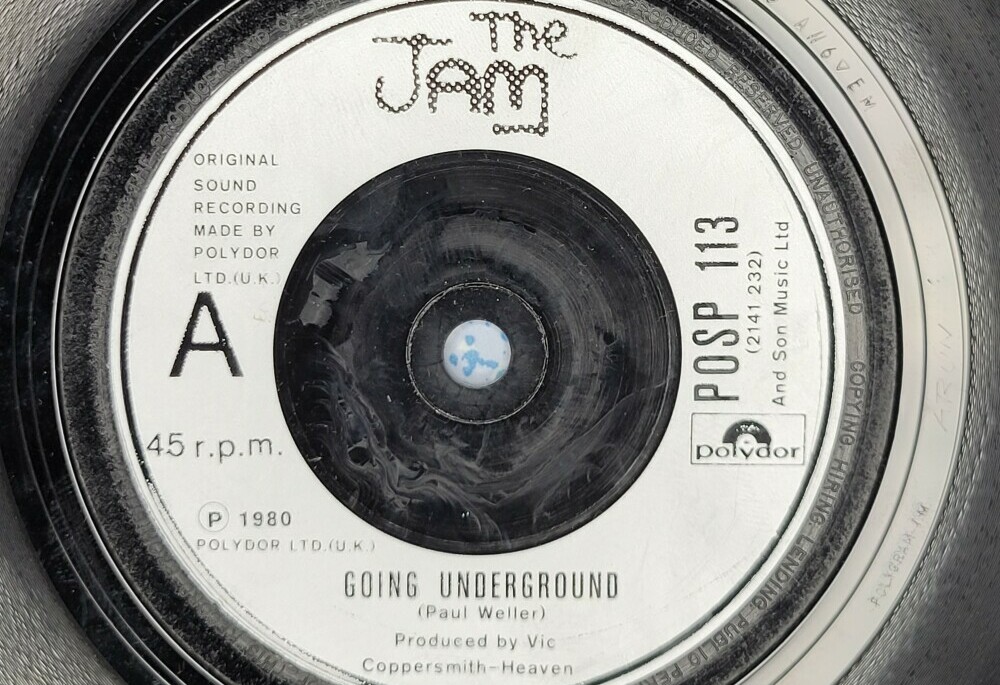
Yes, in the earliest days of Thatcher’s government, the about-to-turn-twenty-two Weller had pinned exactly what she was about. He bemoans the priorities of the new Tory government, complaining that:
“As their lies wash you down and their promises rust
You’ll see kidney machines replaced by rockets and guns”
He was indeed an angry young man. Of course, all politicians say what they need to say to get elected, they don’t get elected otherwise. I’m not suggesting for a moment that Weller would have bought into anything that the Tories would have promised. He’s more frustrated at the way that other people seemed to have swallowed the message pushed in the 1979 general election campaign
A double A-side with Dreams of Children, it smashed straight into the number one spot in the UK singles chart on 22 March 1980. It remained there for three weeks before sliding away. When it was re-released in 1983 after the band had disbanded, it again made the charts, but a more modest number 21.
Unfortunately, this was another one that I didn’t buy at the time that it was released originally – perhaps the plain black sleeve is a bit of a giveaway – but I was a big fan of The Jam. Oh yes, I may only have been ten, but I loved The Jam.
The Jam were all at once called Punks (well they did once open for the Sex Pistols) and New Wave. And of course, they were part of a Mod revival too. Just goes to show, there’s only two types of music, music you like and music you don’t.
Each single carried its own flair, its own story. Perhaps most pertinently, they all carried a promise of timelessness. A sensation which is more than borne out by their enduring irresistibility.
Whether it was a unique melody, futuristic synths, or powerful lyrics, something about each of these songs struck a chord with listeners, and that’s a big reason why they dominated.
The Top Three – The Police, Barbra Streisand and Kelly Marie
The biggest-selling single was The Police’s iconic Don’t Stand So Close to Me. Sting’s distinctive, emotive vocals, convey a sense of tension and urgency, which combined with the provocative storyline captured the nation’s attention.
Sting had been an English teacher for two years in the mid-seventies and the lyrics narrate a story of a young female student’s infatuation with her teacher, highlighting the complexities and ethical dilemmas of such a relationship.
In 2023, Sting confirmed that he had stopped playing the song in his live shows, adding that, “It’s certainly not biographical, but people having relationships with teachers, it definitely happens.” Note that nothing untoward happens in the song or in real life for Sting either.
Sting’s delivery enhances the song’s narrative, with his voice capturing both the allure and the discomfort of the situation. The song’s themes of forbidden desire and the consequences of crossing boundaries resonated with listeners, making it a standout track that blends pop sensibilities with a provocative storyline.
Another heavyweight hit, the second biggest UK single of 1980, was Woman in Love by Barbra Streisand. It’s the emotional depth Streisand brings to the table that made this song a heart-tugging ballad which many found on their own wavelength. You can always tell when a song is designed to be belted out, and Woman in Love was exactly that – a power anthem for the ages.
The third best-selling single of 1980 was Scottish chanteuse Kelly Marie’s hit Feels Like I’m in Love, a quintessential disco track that topped the UK singles chart in September 1980. It captured the vibrant energy of the era.
It was originally penned by Ray Dorset, of Mungo Jerry fame, as a ballad for Elvis Presley. Sadly, he did not get around to recording it. The song features a catchy melody, upbeat rhythm, and Marie’s distinctive vocals.
It was initially released in 1979 when it failed to chart, but it became a surprise hit in the UK a year later, showcasing Marie’s talent and marking her most successful single. The infectious chorus and danceable groove made it a staple of dance floors, making it an enduringly popular tune within the disco music genre.
Other Runners and Riders
Queen’s Another One Bites the Dust thumped its way into everyone’s life with that unmistakable bass line. There’s a reason this song still fills dance floors. It’s that addictive fusion of rock and disco that can make even the shyest wallflower tap their foot. It’s perhaps no surprise that bass guitarist John Deacon is the track’s writer.
Diana Ross had a couple of huge hits in 1980 both written for her by Nile Rodgers and Bernard Edwards of Chic. Upside Down reached the top of the Billboard Hot 100 and number 2 in the UK singles chart.
Less of a hit (US – 5 and UK – 13), but with lyrics and a message which resonated with the gay community and beyond was I’m Coming Out. It had another meaning relating to the fact that she was in the process of coming out from the Motown label and the influence of her former partner Berry Gordy.
Other top-selling dance or disco tunes in 1980 included D.I.S.C.O. by Ottawan, Use It Up And Wear It Out by Odyssey, And The Beat Goes On by The Whispers and Funky Town by Lipps Inc.
1980 also saw the establishment of New Wave and Ska as genuine chart contenders. Top-selling tracks in these genres include the anti-war Enola Gay from Orchestral Manoeuvres In The Dark, Dexy’s Midnight Runners’ Geno, Baggy Trousers, My Girl and Embarrassment from Madness, The Special A.K.A. Live! (EP) by The Special AKA and Special Brew by Bad Manners. Then there was the Ska-flavoured double A-side King / Food For Thought from UB40.
Echo Beach by Martha and The Muffins
Although similar in respect of chart performance to The Vapors, Martha and The Muffins, presented an entirely different vibe. This track is an anthem for daydreamers longing for an escape, and with its post-punk surf undertones, it transported us right along.
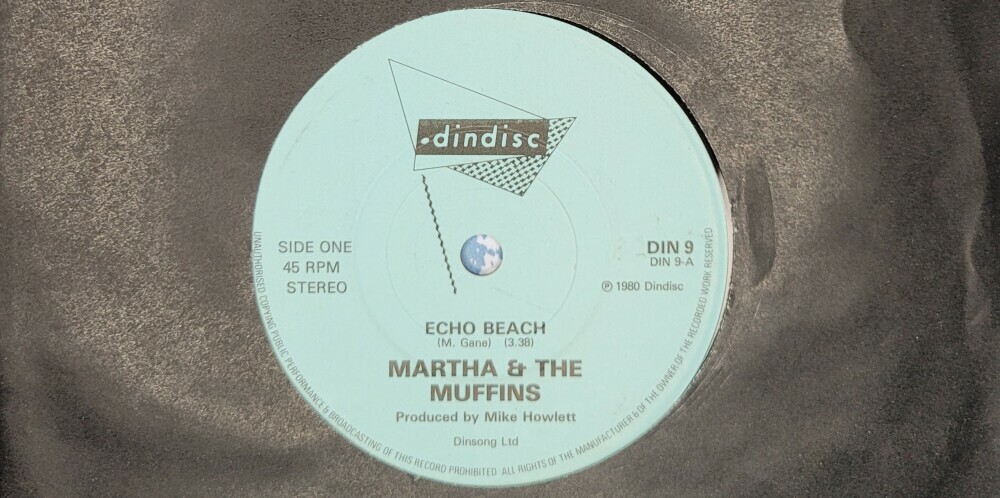
The wistful lyrics resonate deeply, no matter where we find our own ‘Echo Beach’. It’s an easy summer vibe, tinged with the agitation of an office worker wishing the hours away, stuck in the drudgery of her nine-to-five job.
I really loved this track, and it has stood the test of time. Like Turning Japanese, it was an Easter hit, reaching number ten in the UK singles chart a few weeks after it entered the UK singles chart in March 1980.
Martha and her Muffins didn’t trouble the UK singles chart again with that name, but Martha got to number 46 in 1984 with the track Black Stations White Stations as a duo with Muffin Mark Gane under the name M&M. This was a smash in the US dance chart, making number 2.
The Poignancy of John Lennon’s Return to the Charts
John Lennon’s (Just Like) Starting Over was the former Beatle’s first single since 1975 – a comeback of sorts. Released in October 1980, it had done quite well, reaching as high as number 8 in the UK singles chart before falling to number 21.
At this point, Lennon’s life was taken by Mark Chapman outside New York’s Dakota Building. As a result, the track climbed the chart again, reaching the coveted number-one spot. However, not even the death of a rock and pop icon could head off schmaltz, as St Winifred’s School Choir knocked it off the top spot after just a week with their song Grandma just in time for Christmas.
In addition to catchy tunes, these tracks offered a reflection of the era’s cultural zeitgeist. They managed to capture the collective spirit of an age defined by change and channel it into melodies that still resonate decades later – even if some of them are saccharine sweet and sung by gap-toothed cherubs.
Games Without Frontiers by Peter Gabriel
One track to which the epithet saccharine sweet certainly cannot be applied is Peter Gabriel’s Games Without Frontiers. Taken from his third solo album, Gabriel uses vivid storytelling to paint political pictures provoking thought amidst the most accessible of melodies – a blend capable of both entertaining and enlightening.
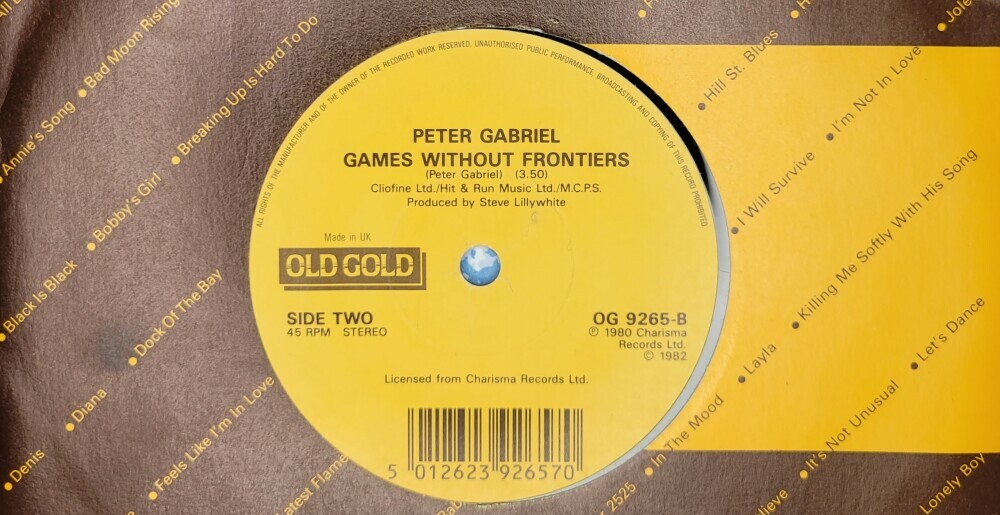
The title references the European TV game show Jeux Sans Frontières, which Gabriel uses to symbolise international politics. The childlike imagery critiques international politics and the absurdity of war, particularly during the Cold War.
The song suggests that nations’ behaviours are as trivial and petty as children’s games, whilst highlighting the serious and often deadly consequences of political actions. For example,
“If looks could kill, they probably will”
emphasizes the potential for minor provocations to escalate into lethal conflicts.
The lyrics also contain another link to Jeux Sans Frontières as Gabriel repeats the refrain, “It’s a knockout.” This of course was the name of the British version, the qualifier if you like, for Jeux Sans Frontières. Just don’t mention Stewart Hall. Seriously, don’t even think of it.
A commercial success, reaching number 4 in the UK singles chart, it is known for its innovative production blending electronic and rock elements. It remains relevant for its critique of political conflicts and the human propensity for war.
As I was only 10 in 1980, there would have been no way that I could have bought the original single, so as you can see, I cheated with this one by buying it from Oldies Unlimited. As a bonus, the other side is Gabriel’s first UK solo single, 1977’s Solsbury Hill.
In a precursor to their 1986 collaboration on Don’t Give Up, Kate Bush sings backing vocals – listen out for the repeated refrain of “Jeux Sans Frontières” especially. It is perhaps forgotten but Games Without Frontiers is Gabriel’s joint top-performing UK chart singles track. Along with 1986’s Sledgehammer, it made number 4 in the chart.
Retro Reflections and the Enduring Legacy of 1980 Singles
As we slide our vinyl back into its sleeve, having revisited the soundtrack of yesteryear, it’s clear that the singles of 1980 are far more than whimsical, throwaway ephemera. They are snapshots or markers in time, encapsulating the emotions and experiences of a generation. Either chart giants that everybody hummed along to, or critically acclaimed tracks that pushed boundaries, they each carry a story.
These pieces of vinyl spun tales of social change, innovation, and the perennial quest for artistic authenticity, resonating powerfully with audiences then, and continuing to impact listeners now. Just consider how Going Underground became an anthem for rebellion and how Turning Japanese remains a cultural touchstone.
The staying power of these singles speaks volumes about the creativity and expression of the artists. I’ve been keen to explore not just the sound, but the significance of the year 1980’s music landscape. It’s a reminder that while trends come and go, true artistry endures and transcends time.
Moreover, the resurgence in vinyl culture highlights a longing for tangibility and nostalgia in the digital age. It’s fascinating how these singles, from Echo Beach to Games Without Frontiers, continue to draw listeners back, inviting a new generation to appreciate the craft and narrative of a different era.
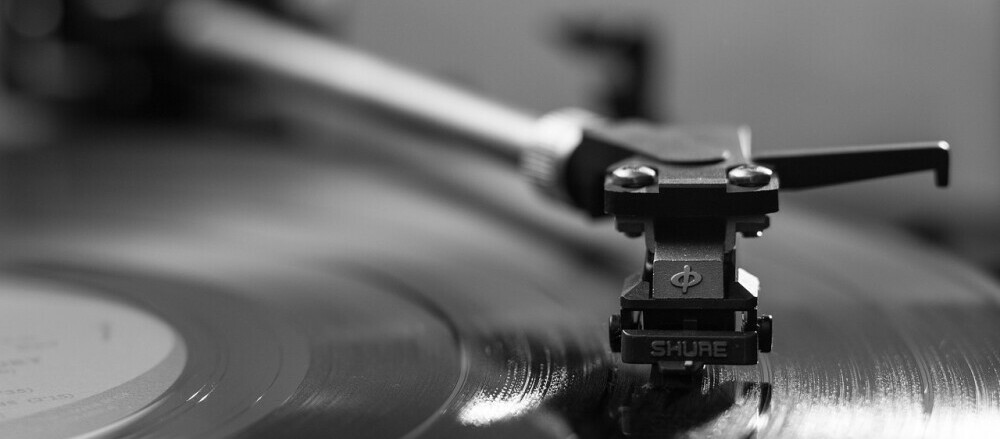
I really hope that you’ve enjoyed reading this walk-through memory lane as much as I’ve enjoyed writing it. Whilst I have later Eighties singles that I am very proud that I bought when they were in the chart, classic singles are available from a multitude of locations out there. Don’t be shy in making a retro-purchase – it just proves that you’ve got taste.
